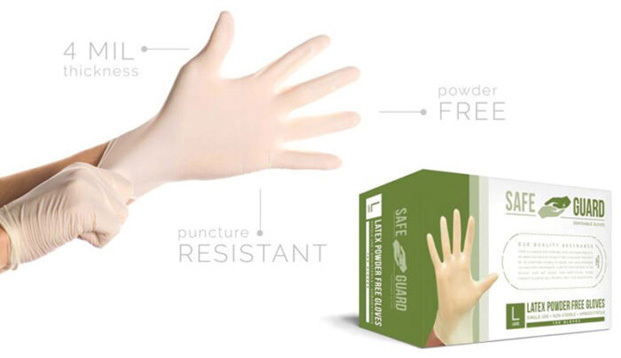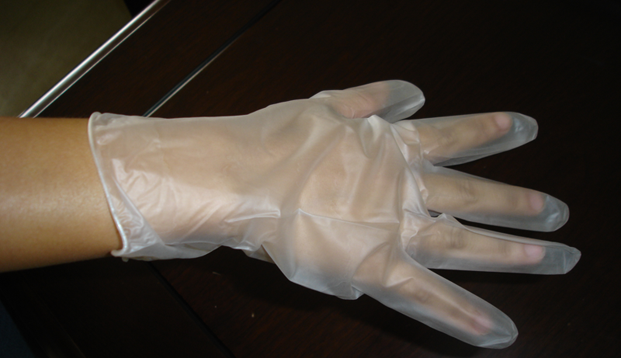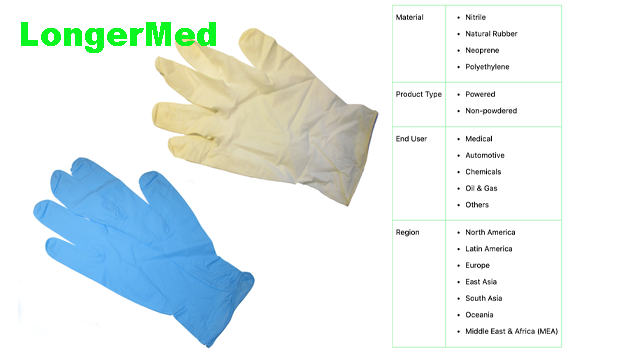Choosing the Right Disposable Gloves
Jacky Chan Oct.02, 2020

It is not surprising in the COVID-19 era that the disposable gloves market is set to grow by 14% in the next seven
years. The global market of nitrile gloves in particular will be worth $8.98 billion according to experts.
Disposable gloves are now one of the most commonly used safety products in the world. They have always been
associated with doctors, nurses and the medical sector as staff strive to prevent cross-contamination between
patients and staff. But, now disposable gloves are commonplace as the general public strives to protect themselves
from coronavirus.
There are several different types of disposable glove and they all have different roles.
Latex Gloves
Latex is thought to be the most versatile glove, but it does contain a protein that can cause an allergic reaction
in some people. And, because they are made of a natural material, they are biodegradable.
Pe Gloves(Polyethylene Gloves)
Poly gloves are commonly worn in the food preparation sector as they are easy to get on and off quickly when chefs
and prep staff are moving between different tasks.
Vinyl Gloves
These are also commonly used in the foodservice industry. They are comfortable to wear, safe and latex-free, which
is important in food preparation as latex can cause reactions in some people.
Nitrile Gloves
It is said that these are the most versatile gloves available. They are the most commonly used in the medical
sector. They come in various thicknesses-from 3mm for the food preparation industry and up to 6mm for the
industrial sector. They can be bought allergen, latex and powder-free so different businesses can buy the type that
most suits their needs.
Powdered gloves or non-powdered gloves?
Powdered gloves are easier to put on and take off. They prevent friction between the skin and the
glove material, which also makes it less likely to rip or tear during use. The powder in gloves is
normally made from cornstarch, but even so, they are still not usually used in the food industry in
case of cross-contamination with the food that is being prepared. The main benefit of non-powdered
gloves is that they don't leave the remnants on the powder on hands after use.
Latex Gloves v Nitrile Gloves
Latex gloves are strong and durable. They are very elastic, which makes it easy for people to put gloves on and
take them off. It is a natural material-made of rubber, which is biodegradable. They are soft and flexible, which
makes them comfortable to wear, and they are safe to wear for long periods of time.
Many people who wear latex gloves say that they feel like a second skin. Surgical gloves are often made of latex as
it helps surgeons retain good movement and dexterity during their procedures.
The main drawback of latex gloves is the fact that they can cause allergic reactions. It is said that six percent
of people are sensitive to latex. Reactions can vary from minor rashes to anaphylactic shock.
Nitrile is a synthetic version of latex. It is chemical and puncture-resistant and it is fast becoming the most
popular type of glove used by hospitals, emergency staff, police officers, security guards, housekeepers, factory
workers and vets. Nitrile is formed by combining acrylonitrile and butadiene to create a synthetic copolymer.
Nitrile gloves are the hypoallergenic choice. They are easy to put on and they are often used in emergency rooms
where doctors might not know what allergies a patient has. But nitrile gloves, while they are very strong, they are
not as comfortable as latex and they are not recommended for work that needs precision, fine movements and
dexterity. They are more likely to be used in examinations and by doctors and surgeons carrying out minor
procedures.
What are the protection levels of gloves?
Nitrile gloves will protect against most chemicals and corrosive materials, but it is not recommended that they are
used in high-risk situations. They are waterproof, greaseproof and oil proof. Rubber gloves are good to use if you
are handling mildly corrosive products. Neoprene gloves are recommended for use with most solvents, oils and
corrosive materials.
Where to buy disposable gloves?
In these days of the coronavirus, disposable gloves are now a common find on the shelves of supermarkets,
pharmacies and home improvement stores. Many online stores are now stocking them, and there are even special
disposable glove stores on eBay and Amazon.
Wearing of disposable gloves has been commonplace in many sectors for many years, but in these new times we live in
almost every worker in every sector is wearing gloves for the protection of themselves and others.









